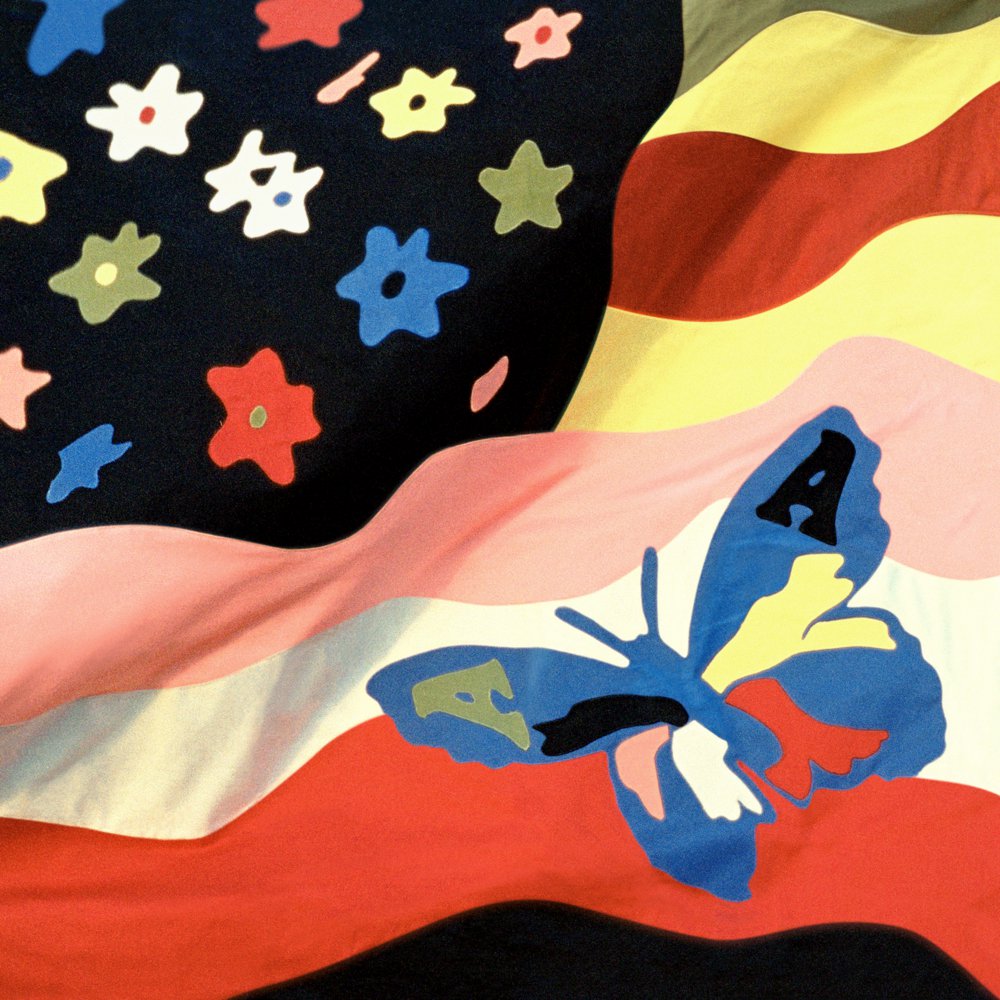The truest moments happen all at once, like fireworks offset by flying monster trucks, or sitting on a sunny desert cliff flanging a guitar at a cutie’s side, or being a kid blowing bubbles underwater in the deep end of the pool at Bold Park. Little things worth bragging about to yourself later on. The initial hearing of Wildflower sits among these deceptively confined experiences. It is an audaciously cinematic soundtrack fitting nothing in particular – but its sweeping synaesthetic kaleidoscopes can crop up your deepest, unrealest teenage dream-memories. This right here is the ultimate unshareable ode to the open road, bureaucracy’s mighty absence, a bird’s-eye view of youthful fun’s lifelong imprints.
Despite its festive, communal exterior and all-star guest list spanning everyone from Danny Brown to Biz Markie to Father John Misty to Royal Trux’s Jennifer Herrema, the album is best suited to intimate listening, for reasons as plethoral as its number of samples. Could-be bangers like “Subways”, with its carefree groove, are instead used as diegetic parts of the Wildflower world, playfully tossed in and out of the foreground through a whole lot of high and low-pass filtering that makes it difficult to actually dance to. Almost every track is framed around unending field effects and dialogue. It’s a musical story about parties rather than music for parties. Even “Frankie Sinatra”, the album’s most realised pop song, is too comfortable in its own unfitting skin to ever become an uncontentious hit.
They may keep the same hypersensory presentation, but The Avalanches seem generally more assured and coordinated than they did back in 2000. Where Since I Left You was a highly cohesive hour-long selection of skiffly schizophrenic repetition, Wildflower boasts an Olivia Tremor Control-esque willingness to constantly and seemingly randomly play around with its own pacing. The lines between songs are now quite thick — they more often than not contain distinguishable and relevant poetic ideas. Many of the tracks involve extended periods of ambience and world-building, and this greater amplifies the impact of moments when rhythm is allowed a place at the forefront. It’s clear from the block-colour album artwork: there’s simply more room for contrast here.
Mercury Rev’s lead mutineer Jonathan Donahue appears on three of the songs, and they show off arguably his most effervescent vocal presence since “Bronx Cheer” (“tell her I don’t care“) way back in 1993. “Colours” is psychedelia itself, seeming pastoral and varnished without having to go get the guitar out. Donahue exudes curiosity over the sound of memories overlapping with a plaintive contentment. “Kaleidoscopic Lovers” makes its mark painting an image of comfy bedtime divinations churning with borderline perversions. “Harmony” is instantly remarkable, a universal tribute to sound and friendship. The fact that this song has been written and released is something to be glad about. Conversations on the nature of shared feelings are far more rewarding than arguments. “Harmony” is proof.
The last five minutes of this event unveil the depressed monologuist David Berman, here in the background all along, a conductor of everything, orchestrally and electrically. The track, “Saturday Night Inside Out”, chronicles its namesake phenomenon, the thwarting existential force that sometimes shows its face when you’re trudging around with fellow midnight souls on the back end of a house party you just know you’ll be internally harping on given two and a half weeks. It’s the spitting image of what weekend escapism and romantic nostalgia mean in the 21st century and the album’s most essential cut.
If there’s anything worth questioning here at all, it’s that the album deals with such extroverted subject matter that it being a highly personal experience makes me feel that there’s some height it hasn’t quite reached. A handful of the tracks I haven’t mentioned are cheesy to the point where their potential to unify uncertain social situations is shattered. If this was avoided, Wildflower could have been downright venerable, an icon for all of us internet children to freely fall back upon on weekends and holidays. Still, music that explores positive emotions in a meaningful and consistently evocative way is rare. The Avalanches have succeeded the most at remaining timely, retaining their crowded, multigenerational aesthetic, showing awareness of the uglifying decoction that’s been our society during the sixteen years it’s taken, and still coming up with music that convincingly embodies happiness.
Words by Harry Manson

